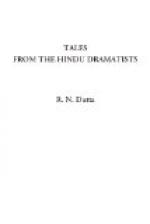It is the work of a Pandit named Jagaddisa, and was represented at the vernal festival; but where, or when, it is not known.
RATNAVALI.
Although the personages are derived from Hindu history, they are wholly of mortal mould, and unconnected with any mystical or mythological legend; and the incidents are not only the pure inventions of the dramatist, but they are of an entirely domestic nature.
It is stated in the prelude to be the composition of the sovereign, Sri Harsa Deva. A king of this name, and a great patron of learned men, reigned over Kashmir; he was the reputed author of several works, being, however, only the patron, the compositions bearing his name being written by Dhavaka and other authors.
RAJA SEKHAR.
Raja Sekhar is the author of Prachanda Pandava, Biddhasalvanjika, and Karpura Manjari.
MURARI.
Murari composed Anargha Raghava.
VENISANHARA.
The author is Bhatta Narayana surnamed Mrigaraja or Simha, “the lion.” He is one of the five Brahmins who, with five Kayesthas, came from Kanouj and settled in Bengal at the invitation of Adisura, the then king of Bengal.
PROBODHA CHANDRODAYA.
This play was composed by Krishnamisra. It is an allegorical play, the dramatis personae of which consist entirely of abstract ideas, divided into two conflicting hosts.
HANUMANANATAKA.
The play is a dramatized version of the story of Rama interspersed with numerous purely descriptive poetic passages. It consists of fourteen acts and on account of its great length is also called the Mahanataka, or the great drama.
Tradition relates that it was composed by Hanuman, the monkey general, and inscribed on rocks; but, Valmiki, the author of the Ramayana, being afraid lest it might throw his own poem into the shade, Hanuman allowed him to cast his verses into the sea. Thence fragments were ultimately picked up by a merchant, and brought to King Bhoja, who directed the poet Damodara Misra to put them together, and fill up the lacunae; whence the present composition originated. Whatever particle of truth there may be in this story, the “Great Drama” seems certainly to be the production of different hands.
VASAVADATTA.
Vasavadatta of Subandhu is a short romance, of which the story is this.




